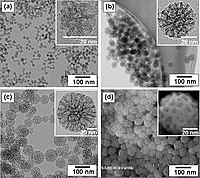
Photo from wikipedia
Bimetallic nanocrystals (BMNCs) with distinguished electronic and chemical properties from those of their parent metals, offer the opportunity to obtain new catalysts with enhanced selectivity, activity, and stability. Here we… Click to show full abstract
Bimetallic nanocrystals (BMNCs) with distinguished electronic and chemical properties from those of their parent metals, offer the opportunity to obtain new catalysts with enhanced selectivity, activity, and stability. Here we describe the facile synthesis of rhodium-copper bimetallic system with different compositions and uniform morphology for chemo selective hydrogenation of functionalized quinolines. Our findings demonstrate that Rh-Cu BMNCs exhibited composition dependent activity and selectivity. BMNCs with rhodium to copper ratio 3:1 surpassed individual Rh and Cu and other compositions both in activity and selectivity for quinolines hydrogenation and performed even better than Rh/C with same amount of Rh. Rh3Cu1 catalyst displayed excellent tolerance for synthetically significant functional groups such as −OH, NH2, F, particularly for aldehyde group which is very reactive towards reduction. These results suggested that the coexistence of rhodium and copper metals play important role in the enhancement of catalytic activity due to synergistic effects and revealed that bimetallic nanocrystals can be promising as practical catalysts for selective hydrogenation of quinoline and other substrates.
Journal Title: Nano Research
Year Published: 2019
Link to full text (if available)
Share on Social Media: Sign Up to like & get
recommendations!